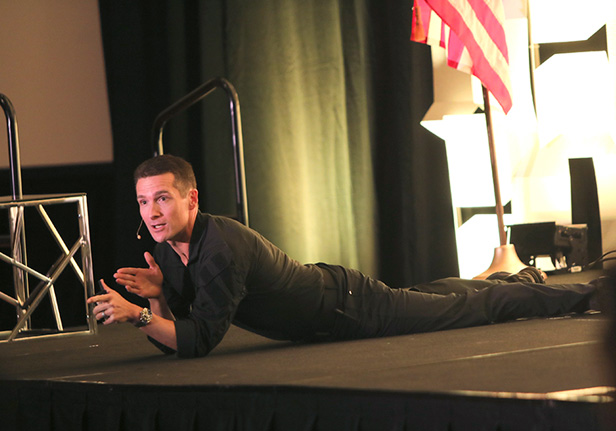October 25, 2023
ASI Power Summit 2023: Keynoters Urge Attendees To Overcome Adversity
Briana Walker, who became paralyzed at the age of 23, and former marine Shawn Rhodes shared their wisdom.

Briana Walker became a paraplegic at age 23 but didn’t let it stop her from becoming a model, dancer, extreme sport aficionado and a mother.
The ASI Power Summit concluded on its third and final day with a burst of energy and a healthy dose of inspiration. Following the previous night’s Power 50 dinner inside The Langham’s Viennese Ballroom (and the reveal of this year’s Power 50 list), attendees regathered on Tuesday morning for a pair of keynotes and an energetic round of trivia, where the winning team had a donation made in their names by the Cohn family to the Juvenile Diabetes Research Foundation.
Here’s a look at the Day 3 keynotes.
‘Quitting Wasn’t an Option for Me’
When she was 23, Briana Walker fainted while driving and hit a cement median at 75 miles per hour.
“In an instant, my life changed,” Walker said. “I broke my back completely in half – it snapped my spinal cord.”
After the accident, she became a paraplegic and had to go through the arduous and emotionally draining process of relearning how to navigate the world.
“I’m living proof that the opposite of success isn’t failure,” she said, adding that she failed every single time at what her physical therapist asked her to do while recovering from her accident. Walker didn’t let failure derail her, instead building up small victory after small victory until she achieved her goal.
The opposite of success, Walker said, is quitting. “Quitting wasn’t an option for me then, and it’s not an option for me now, and I hope it’s never an option for you,” she said during her motivational speech.
A year after her accident, Walker became the first woman to be featured on the cover of Mobility Management magazine. Shortly thereafter, she became a model for Colours Wheelchairs, with her images used globally on buses and billboards to change perceptions of disability. She also formed one of the first-ever wheelchair hip-hop dance teams and performed a televised routine with rapper Ludacris. Post-injury, this extreme sports aficionado has gone skydiving, surfing, skiing and bungee jumping, in addition to completing several triathlons.
“My chair is now a vehicle that gets me through life, not a prison,” Walker said. “All forms of adversity should be a vehicle to get through life and propel us forward. When you’re going through adversity, understand that your current situation is not your final destination.” She compared it to “clawing and crawling” through a dark and scary tunnel: “If you keep going and focus more on the light, as small as it may be, and less on the tunnel, you will make it through.”
‘Bulletproof’ Tactics From the Battlefield
It was 2004 and Shawn Rhodes was embedded with a battalion of U.S. snipers on the frontlines in Al-Fallujah, Iraq. They were spotted – by U.S. troops who thought they were enemy fighters. With their radio out of range and options limited, one of the snipers ripped a wire from the wall, attached it to the radio and dangled it out the window. The radio crackled to life, and Rhodes and the soldiers’ lives had been saved.

Sales expert Shawn Rhodes delivered strategies from his time in military service that will pay off for sales teams.
The sniper didn’t invent the technique – it was the result of training borne out of decades of wisdom passed on by team to team in the U.S. military. Instead of hoping for a solution, the sniper leaned on his training in the highest of stressful circumstances. “Just like on the battlefield, hope is not a strategy you can rely on [with sales],” said Rhodes, an author and sales expert, in his talk on “Bulletproof Selling.”
Rhodes weaved in stories from his military service with corresponding lessons on how sales teams can thrive. Rhodes stressed two key messages:
1. Serve, Don’t Sell. It’s important to have a mission-focused objective, said Rhodes. But salespeople too often are focused on their own products or solutions. “It’s not about our mission,” he said. “It’s about our customers’ mission.” By doing that, you’ll be serving the needs of others, which engenders continued sales success.
2. Leverage the Power of Debriefing. Rhodes recalled that when soldiers came back to the front line, there was always one thing they would do first, even when they were injured from shrapnel: debrief. “They understood the importance of getting everything out of their heads while it was still fresh,” Rhodes recalled. It wasn’t just for the benefit of the team that just returned; that knowledge would help the next team that would be sent in. It’s no different in sales where the accumulated wisdom propels teams to greater success. “If we want to help our salespeople learn a lesson once and not have to repeat it time and time again and lose hundreds of thousands if not millions of dollars,” Rhodes said, “we need to be fanatical about the next team in.”
Those strategies will allow sales teams to take the initiative instead of being reactionary. “Do those two things,” Rhodes said, “and your salespeople will be decades ahead.”
